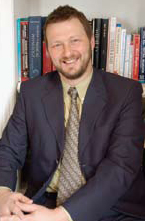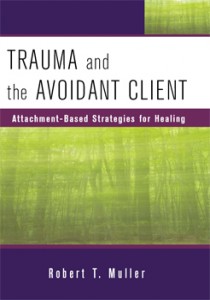TORONTO, November 8, 2011 ─ York University psychology professor Robert T. Muller has won a prestigious international award for his book about how to treat adult trauma survivors who resist therapy.
 The International Society for the Study of Trauma and Dissociation (ISSTD) presented the Written Media Award to Muller for his 2010 book Trauma and the Avoidant Client: Attachment-Based Strategies for Healing. Muller’s award is one of only two Written Media Awards given this year by ISSTD, the leading international academic group devoted to research and treatment of complex psychological trauma.
The International Society for the Study of Trauma and Dissociation (ISSTD) presented the Written Media Award to Muller for his 2010 book Trauma and the Avoidant Client: Attachment-Based Strategies for Healing. Muller’s award is one of only two Written Media Awards given this year by ISSTD, the leading international academic group devoted to research and treatment of complex psychological trauma.
Muller, an associate professor of clinical-development psychology in the graduate program at York, is also an active clinician who works with adult survivors of physical, sexual and mental trauma. His book offers clinicians methods to work with those who are most difficult to treat – those who avoid talking about their history of abuse, which continues to affect them.
In his book, Muller explains the defensive and interpersonal patterns seen among avoidant individuals, and lays out a game plan for effective treatment. Through detailed case examples and practical clinical instruction, he illustrates how to build trust with clients, help them connect with and commit to the treatment process, and facilitate mourning to face the loss associated with trauma.
“It deals with a population of trauma survivors that therapists often view as untreatable,” says Muller. “These people tend to come in focusing on symptoms – often depression or anxiety – and then through the course of therapy they will begin to reveal aspects of their traumatic history.”
It then becomes important for therapists to use techniques such as challenging them about their defensive statements and also to use the therapeutic relationship to help them change, says Muller.
The theoretical framework driving Muller’s approach is attachment theory, pioneered in the 1970s by psychiatrist John Bowlby, who posited that humans form attachments as a survival mechanism to seek protection from real or perceived threats. Even when a protector’s caregiving skills are lacking, the developing child does what is necessary to maintain the relationship; this shapes negative patterns of defense and affect, carrying over into adulthood.
In addition to his role at York, Muller is a supervising psychologist at the Hincks-Dellcrest Centre, specializing in the areas of trauma, attachment, and psychotherapy. He is lead investigator in a multi-site program to treat intra-familial trauma, and has over 20 years of clinical experience in the field. His lab is funded by the Provincial Centre of Excellence for Child and Youth Mental Health at the Children’s Hospital of Eastern Ontario (CHEO).
York University is the leading interdisciplinary research and teaching university in Canada. York offers a modern, academic experience at the undergraduate and graduate level in Toronto, Canada’s most international city. The third largest university in the country, York is host to a dynamic academic community of 55,000 students and 7,000 faculty and staff, as well as 250,000 alumni worldwide. York’s 10 Faculties and 28 research centres conduct ambitious, groundbreaking research that is interdisciplinary, cutting across traditional academic boundaries. This distinctive and collaborative approach is preparing students for the future and bringing fresh insights and solutions to real-world challenges. York University is an autonomous, not-for-profit corporation.
Media Contact:
Janice Walls, Media Relations, York University, 416 736 2100 x22101 / wallsj@yorku.ca

